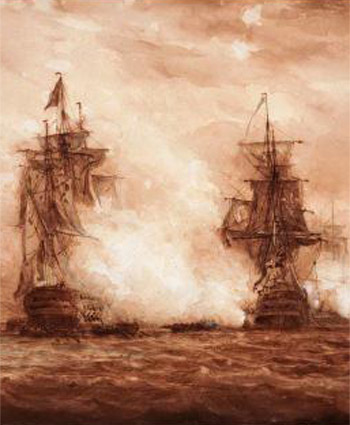I am an extremely patriotic person. I get misty-eyed whenever I hear the national anthem; I love celebrating Independence Day with reading the Declaration of Independence, watching The Patriot (yes, I know it’s not historically accurate), and watching fireworks set to the finale of the 1812 Overture. I’ve thoroughly enjoyed the first two books in J. M. Hochstetler’s American Patriot series: Daughter of Liberty and Native Son, set during the Revolutionary era.
As an American and—as mentioned before—American History minor in college, it’s easy to put myself into the “headspace” of the characters I read about who, against all odds, fought the evil, imperial, cold, heartless (shall I go on?) British at Camden, Boston, Saratoga, Trenton, Valley Forge, and Bunker Hill. After all, the history classes I took and the texts I studied were all written from an American point of view.
But what if I put myself into the mindset of a British woman born in the late 18th century to a father who fought against the Americans? How would my view of world events of the Revolution through the War of 1812 change?
I had to look for sources written from the British POV. For the most part, this involved finding books through online sources or British websites. And while I know that the Americans went to war for what was, in their viewpoint, a just cause, from the British point of view, I learned to see both the Revolutionary War and the War of 1812 as wars of American aggression—the Americans made the first moves against the British in both conflicts.
 My heroine’s father fought against the fledgling American Navy both in the waters off the coast of America and along the coast of England. Later, my hero, William, may have to fight against the Americans in the War of 1812. As I’ve researched the era from the British point of view and placed my British characters (Royal Navy officers) into real historical events, I find myself looking for battles where the British won—where they defeated the Americans.
My heroine’s father fought against the fledgling American Navy both in the waters off the coast of America and along the coast of England. Later, my hero, William, may have to fight against the Americans in the War of 1812. As I’ve researched the era from the British point of view and placed my British characters (Royal Navy officers) into real historical events, I find myself looking for battles where the British won—where they defeated the Americans. As I examined my own feelings about these battles, I had to also think about how my characters would have viewed them. Talking to my father, a career army officer, helped considerably with this. I learned that career military officers do not go to war because they hate the people on the other side. They go to war because their country asks them to. It is not hate that drives them, but love—love of country. They mourn the loss of life on both sides of the battleline. The men who fought for King and Country were no different in their hearts than those who fought for Life, Liberty and the Pursuit of Happiness. In coming to this conclusion, I was able to set aside my “national identity crisis” and develop real, dimensional characters—whether or not they would have been my ancestors’ enemies.
Now, the question becomes: would I be able to portray characters on both sides of the same conflict, making them sympathetic without reverting to stereotypes, explaining the beliefs and causes of both sides honestly without painting one or the other as “good” or “bad” but as equally complex? I may not have the opportunity to do this, but to be able to accurately portray any characters in a historical conflict, understanding both sides will make my story that much richer.
5 comments:
I agree, Kaye. And looking at both sides makes you a better novelist, in my opinion. One book I read a long time ago came to mind as I was reading your post: Denise Williamson's The Dark Sun Rises. She does a good job of showing not only the main character's view (a slave) but also the Christian slave owner's POV. I loved that, and I'm happy to hear other authors are working the same way.
I did a little of that in Brigid of Ireland. I was concerned that Christians might not like that I portrayed a druid as a nice, respectable, and loving person. But the truth is, the ancient druids were not all bad people. The 18th century English were not all bad either and the Americans were not all good!
Did you read David McCullough's 1776? Wow! I never learned that stuff in school!
Hey, I just learned it's Joan's birthday today! Nice of you to mention her books. Happy birthday, Joan!!!!
Yay! I found you! Thanks for the link, Kaye! I added it to my faves.
Oooh! Happy birthday, Joan! How did I miss that? :( One of our own too. I'm sorry.
Oh, and forgot to comment on Kaye's post. (grins) It's *not* easy to get into the head of a character from a side you've been taught your entire life was "wrong." But that's a challenge that can be overcome through research and reading other books. That's what makes it fun!
Post a Comment